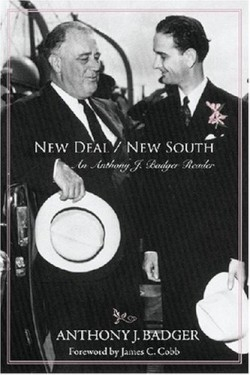New Deal/New South
An Anthony Badger Reader
Southern Strategies: Franklin Roosevelt’s New Deal altered the relationship between the federal government and the states, while offering jobs and a degree of security for downtrodden people. In the South, the New Deal’s legacy was molded and corrupted by powerful conservative politicians who bullied moderate legislators with Jim Crow racist legislation that became the indisputable law of the land.
In New Deal/New South: An Anthony Badger Reader (University of Arkansas Press, 300 pages, hardcover, $59.95, 978-1-55728-843-1, softcover, $19.95, 978-1-55728-844-8), Badger, Paul Mellon Professor of American History at Cambridge University and the author of The New Deal: The Depression Years, 1933-1940*, brings together twelve of his essays that illuminate the contradictions of modern Southern politics. In the entertaining autobiographical introduction the author describes the challenges of teaching the modern American South at Cambridge University. Other essays present engaging portraits of such politicos as Huey Long, Lyndon Johnson, J. William Fulbright, and Albert Gore, Sr. that show how longstanding Southern traditions and the emergence of black activism sorely tested their moderate sympathies.
This collection will inform scholars and other serious readers about the uniqueness of Southern politics and describes how racial relations, conservatism, and liberalism took their own distinct paths along Southern trails that have yet to be unearthed.
Disclosure: This article is not an endorsement, but a review. The publisher of this book provided free copies of the book to have their book reviewed by a professional reviewer. No fee was paid by the publisher for this review. Foreword Reviews only recommends books that we love. Foreword Magazine, Inc. is disclosing this in accordance with the Federal Trade Commission’s 16 CFR, Part 255.

